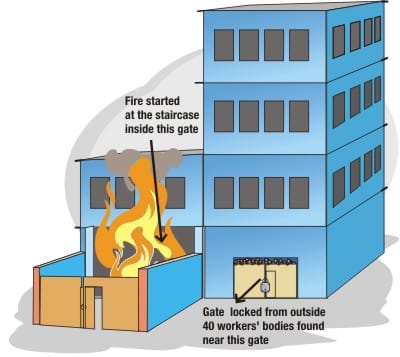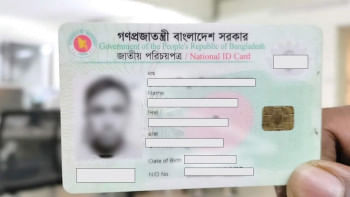Faulty probe leads to impunity for KTS directors

Two garment company directors escaped charges of culpable homicide after at least 54 workers died in a fire in their Chittagong factory in February 2006 despite admitting to a magistrate their role in keeping the exit gates locked.
The police charge sheet relating to the fire at KTS Textiles and Garments did not mention the admissions made in court by the company's chairman, Towhidul Islam Chowdhury, and its maintenance director, Wahidul Islam Chowdhury. Instead, extraordinarily, the charge sheet proposed that the charges against the two men should be dismissed "for lack of evidence".
The Daily Star can also reveal that although the police recommended that 14 other men, including two other directors, the production director and the factory manager, should be charged with homicide, the investigation itself was so superficial that the High Court quashed all proceedings against them. It ruled that the charge sheet had made no "specific allegation" against the men.
The admissions were made in a magistrate court hearing two months after the fire involving offences under the Factories Act where two directors and the factory manager were fined a total of Tk 4,500--the only penalty imposed following one of Bangladesh's worst industrial fires.
Arina Group, of which the KTS factory is a part, also owns three other garment businesses in Chittagong. The company authorities told The Daily Star that they are "finding it difficult to meet the demand for orders" and are now takingsteps to reopen their fire-gutted factory.
THE FIRE
Thursday, February 23, 2006 was like any other day for garment workers employed at the KTS factory located in the BSCIC Industrial Area of Kalurghat, Chittagong. It was dark, overcrowded and the corridors and stairways were cluttered with piles of raw materials, finished garments and machinery.
At 6:00pm, a small fire on the third floor caused by a short circuit barely caused a ripple amongst the workers. Ibrahim Hossain, who at the time worked in the dyeing room told The Daily Star in an interview in December at Chittagong last year, "There were perhaps as many as ten small fires a month. The factory seemed to be fire prone." This particular fire was easily doused.
However, an hour later a spark from welding work at a ground floor entrance fell onto a pile of clothes. The fire spread through the fabric and began to rage uncontrollably after igniting chemicals contained in drums kept by the stairs.
The company had no fire alarm though this was mandatory under the Factories Act. "We did not know about the fire until I saw smoke and red flames outside the window," said Ismail Hossain in December last year, from the fourth floor who suffered burns on a fifth of his body. There was also no fire safety plan--also required by law--the factory was dark, and internal gates within the factory were locked making movement difficult.
This exit where the fire started was the route, which all the workers normally used. In subsequent days after the fire, newspapers suggested that soon after the fire started company managers had ordered the entrance gate to be locked in order to prevent workers from stealing fabric.
It remains uncertain whether this allegation is true, but locking this gate was not in fact the reason for the deaths. Workers have told The Daily Star that the fire was so strong at the entrance that even if the gate were open, it would have been almost impossible for them to escape.
ALTERNATIVE EXIT LOCKED
The reason why so many workers did die was because the only entrance at the front of the building had been deliberately locked by order of the company.
"These gates were only opened for delivering shipments of finished goods. The rest of the time they were closed," said Ibrahim. The gates were only open intermittently.
Forty bodies were found just inside this second set of gates--they had been burnt, crushed or suffocated.
Other workers were trampled to death on the stairways to the second and third floors as they collided with other workers climbing up and down the stairs to escape.
Twelve of the workers who died and seven of the over 200 injured were children under the age of 14. The employment of children in factories was forbidden under Bangladesh law.
The only means of escape was through the windows--either by jumping out or by climbing down ropes made from cloth. Many survived this way though others suffered serious injuries in the process. Some were impaled on the steel rods sticking up in under construction buildings around the factory.
INQUIRY REPORTS
The government and the Bangladesh Garment Manufacturers and Exporters Association quickly set up inquiries into the fire.
Following a public interest litigation filed by human rights organisations, on March 16, 2006, the High Court ordered them to produce their reports before the court within three weeks. Four years have passed and no reports have been filed. The Daily Star was unable to obtain copies of the reports.
However, Amirul Huq, who was at the time a member of the government committee, in an interview with The Daily Star at his office on December 20 last year confirmed that its inquiry found that locking the second gate was the principal cause of the tragedy. And Abu Tayeeb, head of the BGMEA Committee, in another interview at his home on December 20 last year also told The Daily Star, "The incident took place solely because of the negligence of the factory authorities. It is unbelievable how such a devastating fire could take place and spread through the factory so quickly."
FACTORY INSPECTORATE
The Inspectorate of Factories was the government body then responsible for the enforcement of the Factories Act 1965 and the Factories Rules 1979.
Following its investigation, the Inspectorate laid criminal charges in the magistrate's court against the chairman of KTS, its maintenance director, and factory manager Ruhul Quddus for "keeping the exit of the factory under lock and key". The Inspectorate alleged that "as a result [of the locked gate], the workers inside the factory could not escape, resulting in the deaths".
These men could have escaped conviction had they shown that they did not know the gates were locked or that they had acted with "due diligence" in trying to keep the gates open. Section 103 of the Factories Act 1965 also would have allowed their acquittal if they could point a finger at someone else. However, in April 2006--two months after the fire--all three men pleaded guilty at a hearing.
The defendants were also convicted of six other offences. One related to employing child workers and another related to the executives' failure to construct an additional staircase for the second and third floors, as required by the company's own design lodged with the Factory Inspectorate. The deaths on the stairs may have been avoided if this additional staircase had been built (see box for full list of convictions).
The magistrate fined each of the three men a total of just Tk 1,500 for all six offences.
POLICE INVESTIGATION
The most crucial investigation was undertaken by the police.
The day after the fire, a first information report (FIR) was lodged with the Chandangaon Police Station. Sub-Inspector Md Shamsuddin Bhuiyan, who was the mobile duty officer on the night of the fire, named 20 people as responsible, including the main directors and managers of the factory, and proposed that cases should be filed against them for culpable homicide, death by negligence, and for causing grievous hurt.
The investigation was not conducted by a team of police and was not referred to the Criminal Investigation Department.
The Daily Star has compared the FIR and the charge sheet prepared eight months later by Police Inspector Md Selim Ahmed--the third police officer to have been given responsibility for the investigation. The charge sheet contains virtually no new evidence.
It concludes that four company directors--the brothers Towhidul Islam, Wahidul Islam, Khaledul Islam and Ershadul Islam--should not face criminal charges because they were not present on the site on the day of the fire and there was "no adequate evidence against them". The company's accountant, Kamrul Islam, was similarly exonerated.
The charge sheet, however, omitted to mention that Towhidul Islam and Wahidul Islam had already admitted in court their personal responsibility for keeping the gates locked and for not building an additional staircase--admissions highly relevant to these offences.
Whilst dismissing the charges against these five men, the charge sheet did conclude that 14 men should be prosecuted. However, Police Inspector Selim Ahmed failed to set out any evidence to support its allegations, and in June 2007--only a few months after the case was sent for trial--the High Court ordered the cases to be dismissed as "there is no specific allegation against the petitioners...There is nothing on record to show that they locked the gate to prevent the workers from coming out."
It is not difficult to see why the High Court came to this conclusion. The charge sheet did not set out why any one of these people in particular should be prosecuted. It did not even refer to the existence of any of the government and BGMEA inquiry reports, let alone set out their findings.
And as with the chairman and maintenance director, it did not mention that one of the 14 men--Ruhul Quddus, the factory manager--had already admitted his responsibility for locking the gate.
The Daily Star showed the charge sheet to Mohammed Nurul Huda, former inspector general of police. "The investigation was far from adequate. The interest of investigation would have been better served had it been sent to the CID," he said in an interview at his Gulshan residence on February 3. He pointed to the lack of any "chart of evidence" setting out the evidence against each defendant.
Police Inspector Md Selim Ahmed, who wrote the charge sheet, is no longer working at Chandangaon Police Station and neither the Chittagong commissioner nor the IGP in Dhaka could tell us where he is now based.

 For all latest news, follow The Daily Star's Google News channel.
For all latest news, follow The Daily Star's Google News channel. 



Comments